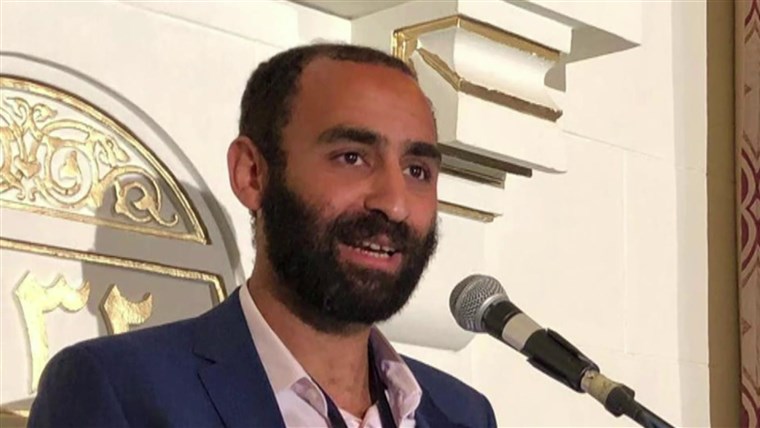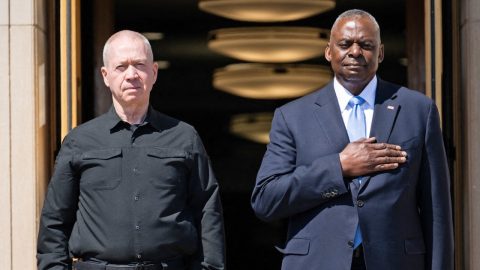Jess Kelly said she knew her husband, Karim Ennarah, was not OK as soon as he spoke to her on the telephone from Egypt.
Ennarah, 37, a human rights campaigner, had called late Nov. 16 to warn her that police had been at his mother’s house in Cairo looking to arrest him, she told NBC News.
“He cried a few times, and said he was sorry that he hadn’t tried to leave sooner,” she said, speaking from London.
The pair had only just got married in September, and after years of talking about living together, Ennarah was just months away from moving to the U.K.
Less than 48 hours after that call, Ennarah was arrested at a restaurant in the Red Sea resort of Dahab, his wife said, making him one of three employees at the Egyptian Initiative for Personal Rights, a leading Egyptian rights group, to be detained in a week.
Ennarah, the group’s criminal justice director, has been caught up in what some say is a vicious escalation in a campaign against human rights organizations by the government of Egyptian President Abdel-Fattah el-Sissi, who was elected into office in 2014 after a military coup the previous year. Rights defenders have for years called out Egypt’s human rights record, but say the scale of oppression under el-Sissi is unprecedented.
Representatives of Amnesty International, the Egyptian Initiative for Personal Rights and Human Rights Watch are now pinning their hopes on President-elect Joe Biden, hoping his administration will pressure Egypt, one of Washington’s closest international allies and among the biggest recipients of U.S. foreign aid in the world, to change its ways.
Biden’s comments have given some hope. During the presidential campaign, he suggested there should be “no more blank checks” for el-Sissi and pledged to revitalize America’s commitment to human rights and democracy around the world.
In the days before being nominated to be the next secretary of state, Antony Blinken said he was concerned by the arrests of the three Egyptian Initiative for Personal Rights employees, retweeting a comment expressing concern by the Department of State’s Bureau of Democracy, Human Rights, and Labor.
Regardless of the incoming U.S. administration’s rhetorical support, Ennarah, Gasser Abdel-Razek, executive director of the Egyptian Initiative for Personal Rights, and Mohammed Basheer, its administrative manager, have all been charged with offenses, including joining a terrorist group and spreading false news or information.
Download the NBC News app for the latest news on the coronavirus
The trio were released from custody Dec. 3 after several governments and a slew of celebrities, including actors Scarlett Johansson, Emma Thompson and Stephen Fry, spoke out against the charges. A number of Western diplomats had met with the group’s leaders in Cairo on Nov. 3. Many believe that the meeting represented the immediate trigger for the charges against its staff.
While international pressure may have resulted in the rights workers’ release from custody, the charges against them still stand. And, in the latest twist, an Egyptian court Sunday upheld a government decision to freeze their personal assets.
Hossam Bahgat, the group’s founder and acting director, said that the prosecution was pushing ahead, adding that it wasn’t clear whether any of the three would be allowed to leave the country.
A fourth employee, researcher Patrick George Zaki, remains in pretrial detention after he was arrested in February on what the group has described as “absurd and generic charges” similar to those leveled at the other staff released last week.
Founded in 2002 to protect basic rights and freedoms through advocacy, research and supporting litigation, the Egyptian Initiative for Personal Rights is one of the most prestigious of such groups in Egypt and has continued to operate from Cairo despite the security risks.
Hussein Baoumi, an Egyptian researcher at Amnesty International, said the recent arrests sent a message to Egyptian human rights organizations that their days are numbered.
“If this crackdown goes on you could see the extinction of the Egyptian human rights movement soon,” he said, speaking before their release.
Will the U.S. act?
While rights groups say President Donald Trump has not done enough to defend human rights in Egypt, before news of the release of the detained men, a Department of State spokesperson said the United States was “very concerned” by their detention and had raised these concerns with the Egyptian government.
“The United States believes that all people should be free to express their beliefs and advocate peacefully,” the spokesperson said.
The Egyptian Embassy in Washington did not respond to a request for comment on the arrest of the men or on the crackdown in Egypt more generally. However, in a Nov. 21 statement posted on Facebook regarding the arrests, an Egyptian Foreign Affairs Ministry spokesperson said there had been no attempt to influence the investigations conducted by the public prosecution.
Under el-Sissi’s government, authorities have jailed tens of thousands of critics and security officers routinely commit serious rights violations, including torture and extrajudicial executions, according to the New York-based Human Rights Watch. Last year, rare anti-government protests in September were followed by a crackdown in which more than 4,400 people were rounded up in a mass arrest campaign, according to the group.
However, even in Egypt the arrest and treatment of the three Egyptian Initiative for Personal Rights employees was seen as a new low point for human rights groups, according to Bahgat, who says he has been banned from traveling outside the country since 2016.
“In terms of the human rights community, it’s been more a matter of suffocating us into silence rather than attempting to decapitate us like now,” he said, speaking before their release. “This is a new level of attempting to shut us down completely.”
The U.S. arguably could put real pressure on the government to lay off. Last year, Egypt received around $1.5 billion in aid from the U.S., most of which comes from a grant program that helps Cairo acquire U.S. military equipment and training. In the Middle East, only Israel and Jordan receive more bilateral aid from Washington than Egypt, according to the U.S. Agency for International Development’s website.
Amr Magdi, a researcher focusing on Egypt at Human Rights Watch, said military assistance and arms sales should be conditioned on the concrete improvement of human rights in Egypt, including stopping the attacks on independent groups. Washington should also publicly call out and condemn human rights violations in Egypt, he said.
But he said Human Rights Watch was also not holding its breath that there would be a radical change overnight when Biden is sworn into office.
“I’m just stressing that this is a chance to do something different and to embrace the brave Egyptian citizens who risk everything on the ground to fight oppression peacefully,” he said. “Instead of embracing their dictators.”
The Associated Press contributed to this report.










Recent Comments